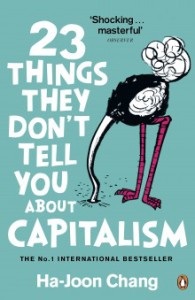 23 THINGS THEY DON’T TELL YOU ABOUT CAPITALISM
23 THINGS THEY DON’T TELL YOU ABOUT CAPITALISM
Ha-Joon Chang
First published 2010
Ah, capitalism. Can’t live with it; can’t live without it. Whether you’re a free marketeer or dreaming of a communist future, at least capitalism’s ubiquity is something we can all agree on. And whatever your stance on market control, there are probably things you don’t know about capitalism and its various orthodoxies. Even I, who expected to receive little more than confirmation of things I knew or at least suspected*, was surprised by some of the content of Ha-Joon Chang’s popular economics book.
23 Things They Don’t Tell you about Capitalism is an informative and accessible book addressing popular myths about the free market. Chang presents them, briefly discusses what believers will tell you, and presents a variety of evidence about why they are wrong. He does this with his typical enjoyable, highly readable style, which gives you a sense that you’re sitting for a coffee with him while he excitedly rambles about economics theory and why everyone else is sadly misguided**.
They were not all myths that I believed or that are universal. For instance, I don’t know many people who cling to the belief that the United States has the best quality of life on earth. But then, most of the people I know understand the affect of outliers on statistics, if only because of economics georg***.
Other myths, though, were surprising but made a lot of sense on further thought. Chang is deeply critical of the microfinance industry, for example, and of the notion that education in and of itself can guarantee financial success and stability. I think I did start to notice the flaws in the latter argument while considering Holding up Half the Sky, which I reviewed earlier this year. There are so many more aspects to poverty than just education. I’d of course argue that education has merits other than basic economics, at least to a point. I nonetheless think Chang is right in pointing out that a lack of basic infrastructure or security for the millions of entrepeneurial poor worldwide is a huge hurdle in achieving business success, let alone growth.
In general, the gently chiding tone and approachable format of this book make it a light but informative read. I am glad I had already read Chang’s Economics: A User’s Guide. While the various economic theories and theorists are not discussed in detail, the odd name pops up that I would otherwise have been unfamiliar with.
I do think I would disagree with Chang on some issues with some further reading, but at this point in my journey into the world of economic theory, all I have are niggling doubts. I shall have to investigate further before I can lodge any form of counter-argument to any of them. I think this is what Chang wants, though. He doesn’t want passive readers; he wants people to engage with and question this book.
If you’re looking for answers to the failures of the modern economy, 23 Things They Don’t Tell You About Capitalism is a great introduction.
*By the way, I’m looking at expanding my repertoir and reading writers I don’t agree with one of these days.
**I… I want to do this. Professor Chang, if you’re ever in town, I just want to fangirl at you. You and ABC finance reporter Alan Kohler.
***If you don’t understand this reference, try googling “spiders georg”. You probably still won’t find it funny. I don’t know why I’m even including it.

